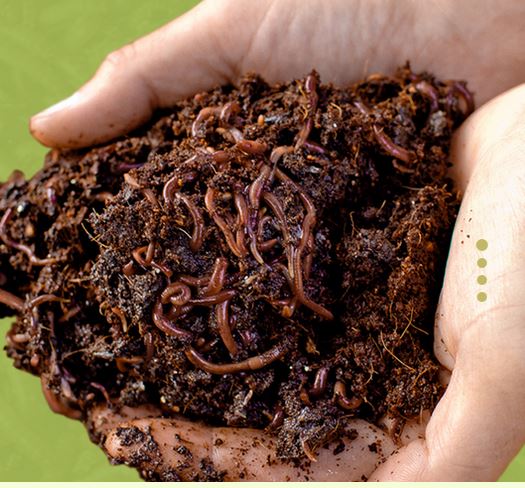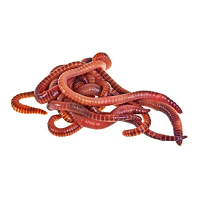Eco-conscious red worms: Best environments for success
Eco-conscious red worms: Best environments for success
Blog Article
Rise Soil Wellness Normally With Red Wigglers
The combination of red wigglers into dirt administration techniques provides an engaging technique for boosting soil health normally. These earthworms not just transform organic waste right into important vermicompost, however their all-natural actions likewise promote enhanced soil framework, aeration, and nutrient availability. Understanding the ins and outs of establishing up and keeping an effective vermicomposting system is vital to completely utilize their advantages. Checking out the necessary steps and possible obstacles included can dramatically impact the effectiveness of this lasting approach. What essential aspects should be considered to maximize the benefits of these remarkable decomposers?
Benefits of Red Wigglers

Additionally, red wigglers boost dirt framework by developing networks as they burrow via the earth. This activity improves oygenation and drainage, helping with root development and making sure that plants obtain appropriate oxygen and moisture. Additionally, the castings produced by red wigglers are high in nutrients such as nitrogen, phosphorus, and potassium, which are vital for plant advancement.
Red wigglers likewise help in the decrease of harmful virus and bugs by outcompeting them for sources, better contributing to a much healthier dirt setting. Their visibility can bring about a reduction in the requirement for artificial plant foods and chemicals, promoting sustainable agricultural methods. On the whole, integrating red wigglers into dirt administration approaches offers a natural and efficient ways of enhancing soil vigor, thereby supporting robust plant growth and farming productivity.
Establishing Vermicomposting
Developing a vermicomposting system is a useful method to harness the amazing benefits of red wigglers in boosting dirt health and wellness. red wigglers. To start, select an appropriate container-- ideally, a plastic or wood bin with a cover to keep moisture and temperature. The bin must have drain openings to prevent excess water accumulation
Following, prepare bed linen material, which works as an environment for the worms. Appropriate materials consist of shredded paper, cardboard, or coconut coir. Go for a depth of 4-6 inches to offer appropriate room for the worms.
Once the bed linens remains in location, introduce the red wigglers, commonly at a proportion of one extra pound of worms for every single square foot of surface location in the container. Following this, add cooking area scraps such as fruit and vegetable peels, coffee premises, and crushed eggshells. Avoid meat, milk, and oily foods, as these can draw in parasites.
(Western North Carolina Worm Farms)
Taking Care Of Your Worms
Preserving the health of your red wigglers is necessary for a successful vermicomposting system. Correct care guarantees that these useful microorganisms can properly damage down natural issue and improve your soil.
Feeding your worms is another key aspect of their treatment. Red wigglers thrive on cooking area scraps such as fruit and veggie peels, coffee premises, and smashed eggshells.
Temperature administration is important; worms prefer a range of 55 to 77 levels Fahrenheit. By following these standards, you will cultivate a healthy ecological community for your red wigglers.
Using Worm Castings in Dirt
Worm spreadings, typically referred to as "black gold," are a powerful modification that can dramatically enhance soil wellness and fertility. red wigglers. These nutrient-rich, natural plant foods are produced by red wigglers throughout their food digestion process, resulting in a finely distinctive product that is beneficial for plants and dirt alike
Incorporating worm castings into your dirt enhances its framework, boosting oygenation and water retention. This is especially advantageous for sandy dirts that drain as well swiftly, in addition to hefty clay dirts that can end up being compressed. Worm spreadings are abundant with essential nutrients, including nitrogen, phosphorus, and potassium, which are essential for plant growth.

Inevitably, making use of worm castings promotes a thriving environment within the soil, bring about healthier plants and even more sustainable horticulture methods.
Tips for Effective Composting
Effective composting requires cautious attention to a few crucial principles that can considerably boost the top quality of the last product. Initially, equilibrium is essential; keep a proper ratio of eco-friendly products (nitrogen-rich) to brownish materials (carbon-rich), preferably around 1:3. This balance promotes reliable decomposition and lessens odors.
2nd, oygenation plays an important duty. Frequently turning the garden compost heap enhances oxygen flow, which accelerates microbial activity and accelerate the composting procedure. Objective for a heap dimension of at least three feet by 3 feet to maintain warmth, which additionally advertises decomposition.
(Hickory)
Moisture web content is another essential aspect; the compost must be damp yet not soaked. A great guideline of thumb is to achieve a wetness level comparable to that of a wrung-out sponge. Also much water can lead to anaerobic conditions, while insufficient can reduce decomposition.
Last but not least, check the temperature of the garden compost. A temperature variety of 130 ° F to 160 ° F indicates energetic composting and helps kill pathogens and weed seeds. By sticking to these principles, you will certainly develop a nutrient-rich compost that supports dirt wellness and enhances plant growth.
Final Thought
Including red wigglers into horticulture methods improves soil wellness through all-natural procedures. These worms add to the break down of natural products, resulting in nutrient-rich vermicompost that improves soil framework and fertility. Their tunneling activities promote aeration and drain while suppressing harmful microorganisms and pests. By establishing and preserving a vermicomposting system, click for source gardeners can promote a sustainable environment that supports durable plant growth and lasting soil resilience, ultimately benefiting agricultural productivity and ecological health and wellness.
Report this page